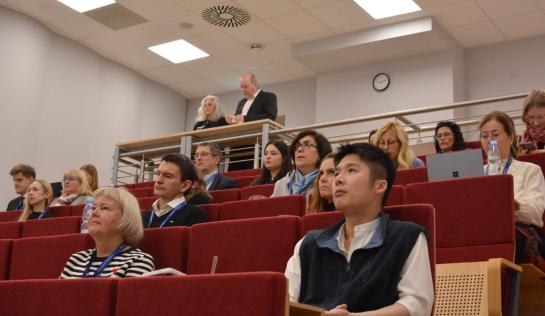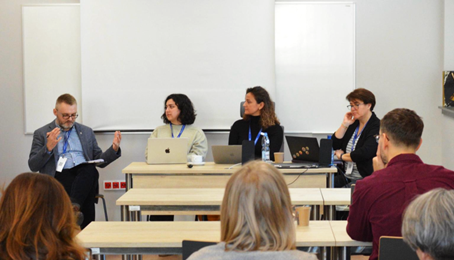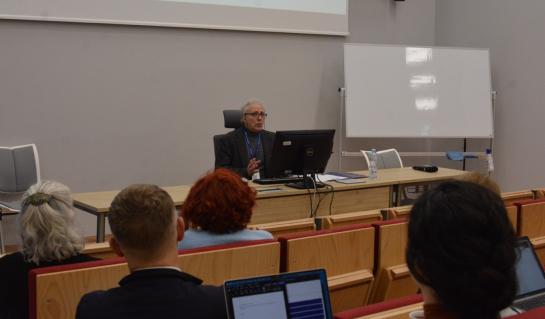07/04/2025, By Shabnam Khezri
The Metropolis Conference, held in Krakow, Poland on January 30th and 31st, brought together scholars and practitioners to discuss the evolving dynamics of migration, diaspora, and settlement. This year’s focus on “Diasporas, Migration, and Settlement” highlighted the role of diaspora engagement in affecting policies and practices in both countries of emigration and immigration. With a mix of plenary sessions, thematic panels, and roundtable discussions involving migration scholars from various disciplines, this conference provided a unique setting for an engaging exchange of ideas.
As a freshly enrolled student in the doctoral program, participating in and speaking at this conference was certainly a valuable experience. I had the opportunity to engage in thought-provoking discussions and contribute to the roundtable session on “Beyond Categories: Understanding Ethnic Segregation and Diversity Through Lived Experiences”. Below, I offer reflections on the key themes discussed in this conference, emphasizing insights from our roundtable as well as a particularly inspiring talk by Professor Marco Martiniello.
Opening Remarks and Keynote Address

The conference commenced with opening remarks from Jack Jedwab (Metropolis Institute), Dr. Jan Brzozowski (Jagiellonian University), and Dr. Konrad Pędziwiatr (Cracow University of Economics), highlighting Poland’s shifting migration landscape. Once a country of emigration, Poland has become a major hub for both economic migrants and refugees, especially since the beginning of the war in Ukraine and the EU-Belarus border tensions, leading to an even stricter Migration Strategy for 2025-2030 that prioritises securitisation of migration. As of January 1st, 2025, Poland has assumed the presidency of the Council of the European Union, therefore, making it a key goal of this conference to constructively contribute to the ongoing debates in migration studies in Poland.
The keynote address, delivered by Professor Min Zhou (University of California, Los Angeles), critically examined the transformation of migrant social networks in the digital era. Through a comparative analysis of two major waves of Chinese migration to the U.S. (1990s vs. post-COVID era), she discussed two contrasting patterns of migrant networks – networked collectivism bound by co-ethnic ties and mutual trust, and networked individualism defined by fragmented weak ties dependent on virtual spaces—and their impacts on cross-border movements and host-society integration, making them crucial for migration governance and policy making.
Beyond Categories: Understanding Ethnic Segregation and Diversity Through Lived Experiences
As a speaker in this roundtable session chaired by Tuba Bircan (VUB), I had the privilege of engaging in a discussion with Didem Danış (Galatasaray University), and Grzegorz Demel (Polish Academy of Sciences). The session sought to deconstruct the way ethnic and migrant identities are classified and how these imposed labels impact individuals' lived experiences.

At this roundtable, we questioned the assumed coherence of terms like ‘migrant’ and ‘minority’, exposing how these categories flatten complex identities and lived experiences. My contribution, following the insights gathered in the SeLiS Project with my colleagues, focused on how diaspora identities are not static but constantly negotiated through intersections of class, race, gender, and socio-political conditions. Diaspora identities are not monolithic; they evolve through intergenerational processes shaped by migration history, state policies, and social hierarchies. Drawing on various case studies, including Turkish migrants in Turkey and Ukrainians in Poland, the discussion illustrated how (experiences of) belonging and segregation are framed differently depending on political and historical contexts.
Poland’s Ukrainian communities provided an interesting case study—despite shared ancestry, deep-seated differences persist based on different migration waves, cultural imaginaries, and power structures within the diaspora itself. Similarly, Turkey’s historical migration patterns reveal a “hierarchy of desirability,” as described by Didem Danış, where ethnic kin groups like Bulgarian Turks have been more readily integrated, while Syrian refugees remain on the fringes of society, trapped in precarious legal and social limbo. The discussions pointed to the need for a non-essentialist, processual approach—one that sees diaspora identities not as fixed entities, but as an ongoing negotiation shaped by historical migration patterns, state policies, social attitudes, and lived experiences.
We also explored how national policies and socio-cultural narratives shape diaspora formation in different contexts. Poland’s Ukrainian diaspora exemplifies how imagined notions of "common culture" can paradoxically deepen divisions, reinforcing internal hierarchies rather than uniting communities. In Turkey, state policies have selectively incorporated some migrant groups into the national identity while sidelining others, demonstrating how legal status and social mobility are intrinsically linked to nationalistic narratives. Beyond these national cases, the conversation touched on broader European migration policies, where census classifications and administrative labels homogenize diverse populations. Together, our discussions illustrated the double bind of ethnic categorization: while classifications are necessary for policy and governance, they also shape how people are perceived and treated in ways that may not align with their lived experiences. We underscored the need to take a critical, reflexive approach to defining and categorizing migrant communities. Instead of relying on static labels, migration studies should adopt a more dynamic, intersectional approach that acknowledges the diversity of migrant experiences and the ways migrants themselves negotiate their identities in response to exclusionary systems.
Marco Martiniello: Cultural Life in Superdiverse Cities

One of the most inspiring talks at the conference was delivered by Professor Marco Martiniello (University of Liège). His research on cultural life in superdiverse cities explored how ethno-racial separation is both reflected and contested through cultural practices.
Martiniello posed a compelling question: Does cultural life help migrants and diasporas secure recognition in society, or does it reinforce marginalization and exclusion? His findings revealed a dual reality. While certain cultural spaces—such as music festivals, artistic collectives, and diaspora-led cultural initiatives—enable migrants to express agency and solidarity, they also risk being relegated to “ethnic enclaves”, rather than being recognized as part of mainstream cultural production, resulting in a de facto separation in the cultural life of superdiverse cities.
Drawing from his talk, I noted that ‘glocal’ communities of artistic practices in superdiverse cities, such as collectives of dancers or musicians, have significant potential to invent new forms of sociability beyond borders, deconstructing existing social barriers even when the society around them remains marked by racialisation and discrimination. Culture and arts, like sports, are not essentially vectors of separation, exclusion, and discrimination, nor are they mere vehicles for encounters and exchange between populations of superdiverse cities. Rather, they have the potential to be one or the other depending on what the citizens, civil society, the political worlds, market forces, and cultural institutions make of them.
Final Reflections: Moving Forward in Migration Research
The Metropolis Conference 2025 brought together a wide array of panels and workshops addressing topics such as diaspora engagement, migration policies, identity formation, entrepreneurship, and the complexities of belonging in transnational contexts.
While the conference successfully covered a broad spectrum of migration-related issues, there remains room for further critical engagement. Core concepts like diaspora, integration, and belonging were central to many discussions but were often treated as self-evident. A more explicit reflection on the historical, political, and social dimensions of these terms could enrich analyses, challenging taken-for-granted assumptions and revealing how such concepts shape both research frameworks and policy interventions.
Additionally, there was an opportunity for more explicit incorporation of intersectional perspectives. While factors like gender, class, and legal status were mentioned, they were rarely examined in depth or in relation to intersecting identities. Adopting a more intersectional lens would provide a fuller understanding of the diverse and layered experiences of migrants and diaspora members, moving beyond reductionist categorizations.
To strengthen future conversations, migration research must (continue to) move beyond rigid ethnic and migrant categories, recognize the agency of diaspora communities, and address the structural barriers that affect labour market access, political participation, and social involvement. While the conference offered a robust platform for exchanging empirical findings and interdisciplinary insights, deepening the theoretical engagement and critically examining the frameworks that underpin migration studies will be crucial. Such reflexivity ensures that migration research remains attentive to the power dynamics, structural inequalities, and lived realities that shape mobility, belonging, and settlement. As migration continues to be a defining issue of our time, fostering nuanced, inclusive, and critically informed dialogue will be key to advancing the field.
This blog post is a reflection on the discussions and themes explored at the Metropolis Conference 2025 in Krakow. For more information, visit www.metropolisconference.ca
